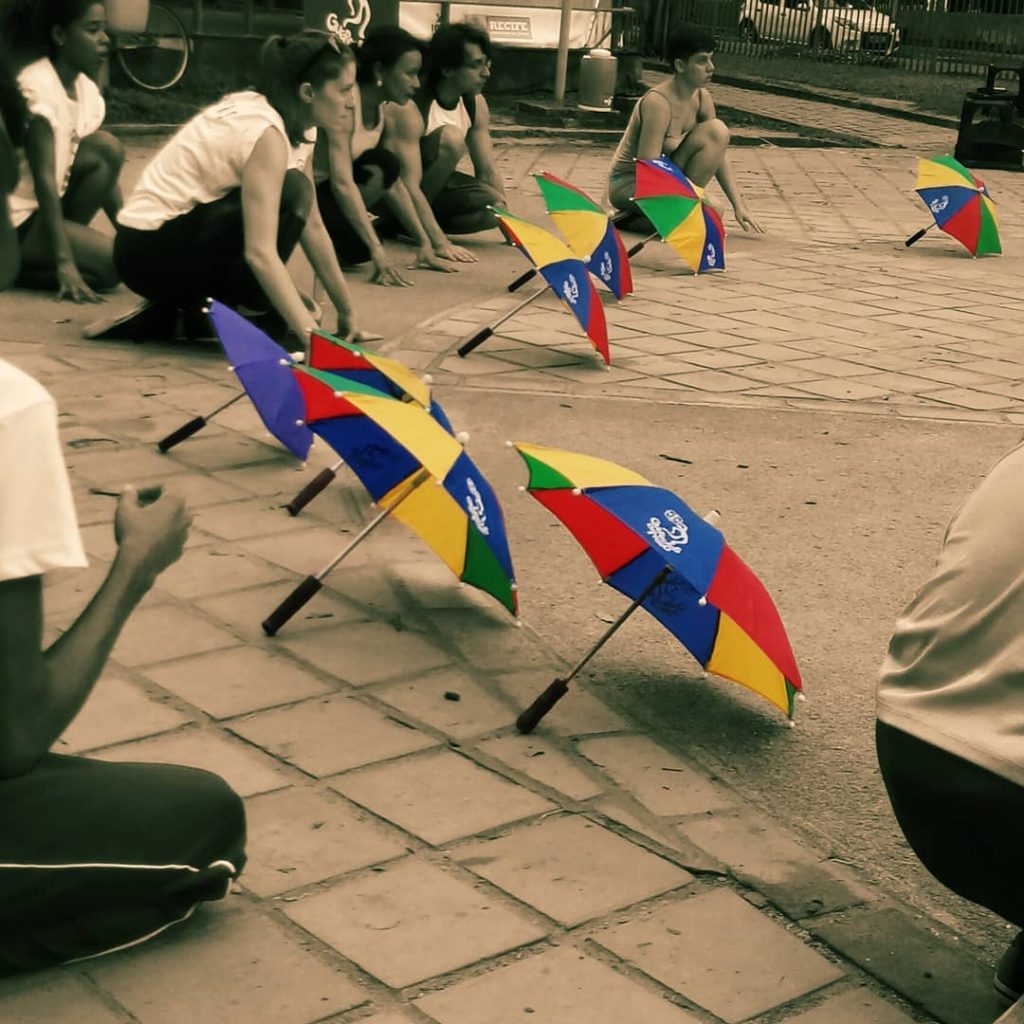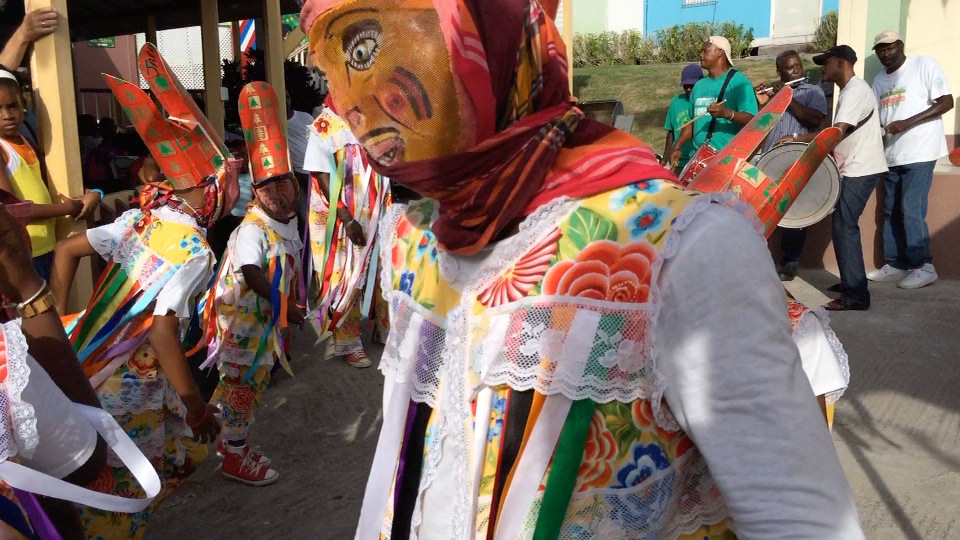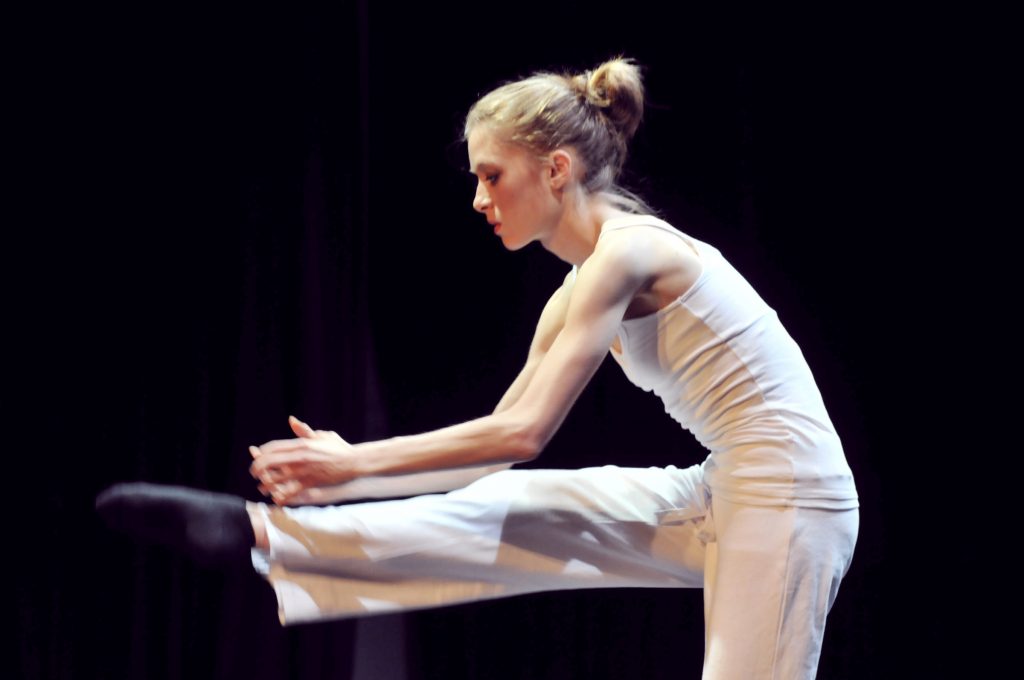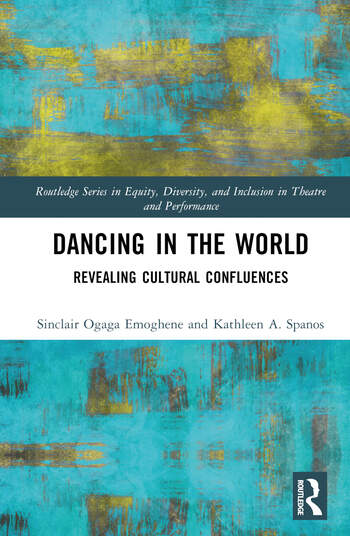Book Project: Dancing in the World: Revealing Cultural Confluences
How can we create more inclusive spaces in the field of dance?
This book co-authored by Sinclair Ogaga Emoghene and Kathleen A. Spanos presents a framework for dance practitioners and researchers working in diverse dance cultures to navigate academia and the professional dance field. The framework is based on the idea of “cultural confluences,” conjuring up an image of bodies of water meeting and flowing into and past one another, migrating through what they refer to as the mainstream and non-mainstream. These streams are fluid categories that are associated with power, privilege, and the ability (or inability) to absorb other cultural forms in shared dance spaces. In reflective interludes and dialogues, Emoghene and Spanos consider the effects of migration on their own individual experiences in dance to understand what it means to carry culture through the body in various spaces. Through an analysis of language, aesthetic values, spaces, creative processes, and archival research practices, the book offers a collaborative model for communicating the value that marginalized dance communities bring to the field.
The book is accompanied by a video podcast, along with other related projects in development.
Postdoctoral Fulbright, Universidade Federal de Pernambuco, Recife

I was awarded a postdoctoral Fulbright U.S. Scholar award for my project “The Frevo Tradition and Pernambucan Cultural Identity in Recife, Brazil.” From January to July 2018, I was based at the Universidade Federal de Pernambuco in Recife to study frevo dance and music in Brazil. My research questions related to frevo’s origins in capoeira, frevo as a “dance of resistance,” and the role of “danças populares” in cultural identity formation in Pernambuco. The project developed out of my dissertation research, which focused on similar themes in dance, music, and festival on the Caribbean island of Montserrat, combined with my interest in Brazilian culture.
Research publications:
- A Dance of Resistance from Recife, Brazil: Carnivalesque Improvisation in Frevo, published in Dance Research Journal, volume 53, number 1 in December 2019.
- Dancing between Pedagogy and Performance: Guerreiros do Passo and the Case of Brazilian Frevo, co-authored with Amilcar Bezerra, published in Dance Chronicle, volume 43, issue 1 in March 2020.
- Frevo: A Reflection on Dances of Resistance during Times of Protest, published on the Smithsonian Folklife Festival Blog in September 2020.
- Dances of Resistance and Social Inclusion in Brazil: Frevo and Popular Dances of Pernambuco, published in Handbook of Social Inclusion, Springer in April 2021.
- O Corpo é Tudo: Theory, Practice and Resistance in the Body, published in Incomum Revista, volume 2, issue 1 in May 2021.
Ph.D. in Dance and Performance Studies, University of Maryland

I earned my Ph.D. in Dance & Performance Studies at the University of Maryland, College Park. My dissertation is entitled: “Dancing the Archive: Rhythms of Change in Post-Volcano Identities on Montserrat, West Indies.” My research investigated the role of dance, music, and festival performances in the formation of national and cultural identities on the Caribbean island of Montserrat.
Montserrat (the “Emerald Isle of the Caribbean”) has historical ties to Ireland and performances of “Irishness” there differ from elsewhere in the world, especially during the island’s annual St. Patrick’s Festival. My project related to larger questions about hybridity and creolization in African and Irish rhythms, migration, diaspora formation, and transnational histories.
In 2017, I was a featured researcher on Academic Stories: “Turning a Passion for Dance into a PhD” by Sarah Binns.
Research publications:
- Dancing the Archive: Rhythms of Change in Montserrat’s Masquerades, published in the 49th volume of the Yearbook for Traditional Music (published by the International Council for Traditional Music, ICTM) in 2017.
- Locating Montserrat Between the Black and Green, published in the 9th volume, 2nd issue of the Journal for Irish Migration Studies in Latin America (published by the Society for Irish Latin American Studies) in 2019.
Master’s in Traditional Irish Dance Performance, University of Limerick

I received my Master’s degree in Traditional Irish Dance Performance from the University of Limerick‘s Irish World Academy of Music & Dance.
I worked in a variety of percussive dance styles including modern competitive Irish step dance, traditional Irish dance (sean-nós and North Kerry/Molyneaux), festival style Irish dance from Northern Ireland, contemporary Irish dance, tap, flamenco, clogging, and body percussion. My thesis performances included both solo and ensemble work, including my solo called “Color Play” about synesthesia and colored rhythms.
Bachelor’s in Cognitive Science, University of Virginia

I received my Bachelor’s degree from the University of Virginia in Charlottesville in Cognitive Science, with a minor in Computer Science and a concentration in Neuroscience.
I worked as a teaching assistant and research assistant in the Levy Lab (neural networks), and also as a research assistant in the Kubovy Lab (visual and auditory perception), where I researched and wrote my fourth-year thesis on the perceptual phenomenon called synesthesia (read Journal of Vision, Psychology Today, and UVA’s Arts & Sciences article).
